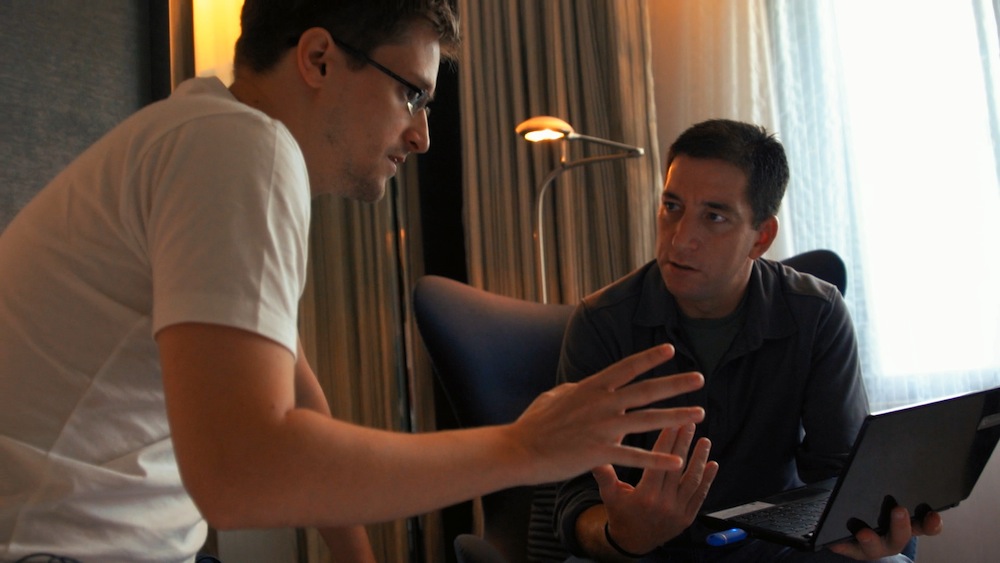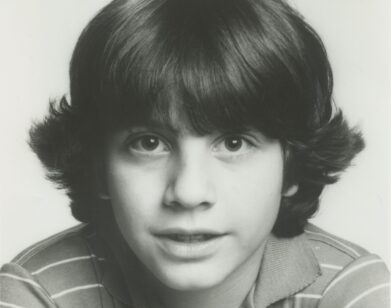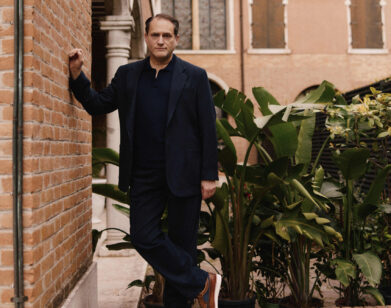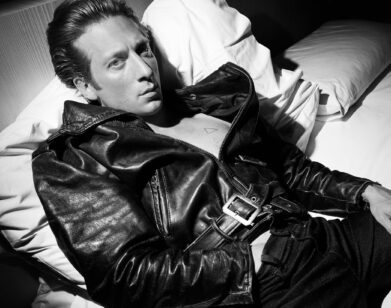Laura Poitras: Citizen
When Laura Poitras and Guardian reporter Glenn Greenwald traveled to a Hong Kong hotel to meet with an unidentified NSA whistleblower providing classified documents in May 2013, he told the pair that as an identifying signal, he would be working on a Rubik’s cube. He said, “Approach me and ask if I know the hours of the restaurant. I’ll respond by stating that I’m not sure and suggest you try the lounge instead.”
Calling from San Francisco, Laura Poitras boils down her work as a journalist and filmmaker: “The kind of work that I do is to spend time with people and follow them in real time.” Taken at the most basic level, sure, that is what Poitras, a Pulitzer Prize winner and Oscar nominee does, but the stories she tracks and the individuals she follows end up serving as the human faces of globally-reaching controversial political and social issues.
That whistleblower, now known as former NSA contractor Edward Snowden, first began contacting Poitras through encrypted email channels in January 2013. After the meeting in Hong Kong, she began filming immediately, and the activities of the eight-day period in which she, Greenwald, and fellow Guardian reporter Ewen MacAskill spent holed up with Snowden reviewing documents and interviewing the then-29-year-old, are the core of her latest film, Citizenfour, named for the anonymous handle Snowden used in his initial emails to Poitras.
Poitras has her own experiences with surveillance after the release of her Oscar-nominated documentary My Country, My Country, a verité style slice of the lives of Iraqi citizens under U.S occupation, and the first in her trilogy on the post-9/11 world. She was put on a federal watch list in 2006 and subjected to repeated detainments and interrogations at the US border after traveling internationally until 2012. She began a film on the NSA and surveillance state in 2011, the third in her trilogy, documenting whistleblowers Thomas Drake and Walter Binney, but the emergence of Snowden and his revelations brought Poitras further into the fold of the U.S.’s surveillance activities than she ever anticipated. At one point in their correspondence, Snowden writes to Poitras, “You asked why I chose you. I didn’t. You chose yourself.”
Poitras relocated outside of the U.S. to Berlin in 2012 to ensure protection of her work and sources from the U.S. government, and is one of the co-founders (along with Greenwald and Jeremy Scahill) of the digital publication The Intercept, which covers further reporting related to the NSA.
We spoke to Poitras this week by phone.
COLLEEN KELSEY: Did part of your interest in working on a film about surveillance stem from being put on the federal watch list in 2006?
LAURA POITRAS: Yes and no. That rattled around in my head from the moment The New York Times broke the warrantless wiretapping story, which was in 2005. I was pretty aware that part of the aftermath of 9/11 was the growth of surveillance, both domestically and internationally, so it was very much part of the theme of things that I was interested in. I think being put on a watch list and being stopped probably made me more sensitive to it, but I probably wouldn’t have pursued it to that extent. I don’t usually make personal films. It really was when I read this New Yorker profile of Thomas Drake and his being charged with espionage and then what happened to the other people in the NSA who blew the whistle on domestic spying right after 9/11, and that included William Binney. Once I started filming with Binney I was like, “Now there’s a way to talk about this, because rather than taking an abstract thing—here is a person who worked within the agency, who has come forward.” I started filming with him and Tom Drake, and others.
KELSEY: At what stage when Edward was contacting you anonymously were you convinced he was legitimate?
POITRAS: Pretty early on, probably by February of 2013. My instincts were, “This sounds genuine,” because of the level of detail he was providing, but I was also skeptical. I asked, “Who are you, why are you contacting me, how do I know this is not some sort of entrapment effort?” I probed to find out more, and also what his motivations were, and all the basic due diligence in this kind of situation. But even though I was asking those skeptical, paranoid types of questions, there was another part of me that was thinking, “This could be legitimate.”
KELSEY: Did you have any preconceived notions about who the source would be before you met Edward in person?
POITRAS: I did. I expected to meet somebody who was older, probably more like Tom Drake, in that range, or maybe younger. It was clear that the person I was talking to had a really deep understanding of the Internet, so he couldn’t have been that old. I was thinking 40s. And there were ways in his correspondence that he led me to believe he was older. He would say things like, “I remember back in the Bush days,” in this kind of nostalgic thing, and I think he was trying to not reveal who he was at that point.
KELSEY: Well, it’s interesting because he was so forthcoming about his willingness to identify himself, almost from the get-go. Do you think that decision to be forthcoming about his intentions affected the trajectory of how the public perceived him and his story?
POITRAS: Absolutely. For the first three months when I was emailing with him, I thought he would always remain as an anonymous source, and at some point I’d get documents, and then I would never know who he was. Then in April he said that he planned to say he’s the source, and didn’t want a situation with this massive leak investigation that would involve others. I think he also believed it would eventually lead to him. But he had already made the decision that he would come forward and not hide his identity. But when he told me, I said, “If that’s the case then we need to meet, and I want to film.” I do think that it did change the dynamic. It made it such that he could express his motivations of why he feels that this information should be known by the public and should be debated publically, and not be made secretly by secret courts and secret interpretations of laws.
KELSEY: Did he agree to be filmed before you met, or was that something that happened at the initial meeting? You started filming almost right away in Hong Kong.
POITRAS: He agreed before. When I asked him in April I said, “I would like to meet you.” His response was no, he didn’t want to, and he had two reasons for it. One was he didn’t want to be the story, and the second reason was he was concerned that if both of us were in the same place, and if anything were to happen, that the reporting maybe couldn’t go forward. I had to provide some sort of assurance that there were back-ups, or whatever, and that the information wouldn’t be stopped. Then I also made an argument for the fact that even if he didn’t want to be the story, the media will talk about him and speculate on his motivations, and since he’s coming forward he should articulate why. That’s the context in which he agreed to have this meeting. Once he said, “We can meet sometime soon,” I went back to New York and waited to find out where, thinking that I was going to get on the train and go to suburban Maryland for this meeting. Then I realized I was going to have to travel a lot farther.
KELSEY: And Glenn came in as that additional assurance?
POITRAS: The situation with Glenn is Snowden had contacted Glenn first, in December. They talked but it was not encrypted and then Snowden reached out to me, and unbeknownst to Glenn and I, we were both talking to someone. Then in February Snowden made it clear, he said, “This reporting will require more than one person, I suggest that you involve Glenn.” He knew that Glenn and I were both on the Board of Directors at the Freedom of the Press Foundation. I had known Glenn, and he had written a story about my border detention situation. So then Glenn and I had a face-to-face in April where I told him I had been contacted by somebody claiming to have evidence of government wrongdoing and surveillance, and asked if he wanted to be involved. He immediately said yes. Then he went back to Rio, and I didn’t have an encrypted channel with him. When I went back to New York in May I was struggling to be able to talk to Glenn in a way that I felt secure about. We tried to send him some encryption tools that got held up in customs, et cetera. But finally he did get in touch, and then he immediately came to New York and then we travelled together.
KELSEY: Considering that you had already been working on the film with other characters for an extended amount of time before talking to Snowden, what was the process of restructuring the narrative to include him?
POITRAS: This film I’ve made in collaboration with my editor, Mathilde Bonnefoy, and we realized in the editing process that we’d shot material for two films. We weren’t going to try to force them into one and make a film that’s not as good because we have a lot of material, but that we’d separate them. We knew the Hong Kong section was going to be the core of the film. Therefore the decisions of what made sense to include before and after had to be in relationship to that.
KELSEY: It must have been quite tense when you were in the hotel room with Snowden, and documenting him, and learning his motivations while the world is interacting with the story at a basic level when Glenn published his first stories. Only you few people had the knowledge of how big this was.
POITRAS: Definitely. When I got back to Berlin after doing the filming in Hong Kong, I did actually say, “It’s not appropriate for me to go in the editing room right now.” That’s because there’s so few people who have access and I’m one of them, I need to focus the attention on doing the reporting. I started collaborating with Der Spiegel and reporting in Germany. Later I did some work with The New York Times and James Risen. But at some point I realized that there was also urgency for the film to be finished and be in the world, and I think around January this year is where I said, “Okay, I’m going to pull back a bit from working on the reporting, and finish the film.”
KELSEY: When Snowden contacted you personally you automatically became a character in this narrative. Was that something that you were reluctant to be a part of? It was inevitable, but you’re not used to making films with yourself as a part of it.
POITRAS: It was new for me. In a strange way I got pulled into the narrative when I first got put on a watch list. You know, there is sort of a weird chain of consequences. I was documenting the post-9/11 era and then somehow I got pulled into the history that I was documenting. Then Snowden contacted me. It was pretty obvious that with this film, it needed to be told from a subjective point of view. How to approach it was the question, and I still very much like building narratives that use scene structure. I film in this vérité way—which you can cut in scenes that are more similar to a fiction drama, rather than interview format. There’s something rich about building scenes upon scenes that I really like, and I also shoot, so I am behind the camera. It’s very hard for me to be in front of the camera because the camera is the tool that I use to tell the story. It was trying to find the balance of how much subjective voice without it becoming personal essay.
KELSEY: It seems like moving to Berlin was critical for you to keep reporting.
POITRAS: I moved to Berlin in the fall of 2012. It was to protect source material, and in response to the fact that I kept getting detained at the U.S. border and just I felt I couldn’t work there. I couldn’t feel confident if I brought footage back and forth. I went to Berlin to focus on the editing, and that’s where I started working with Mathilde. It’s a pretty amazing city, and I’ve had a really fantastic collaborative experience. Now that the film is done, I don’t know that I can just leave Berlin so quickly even though I still miss New York a lot.
KELSEY: During the process of editing the film were you approached by anyone looking find information or suppress what you were doing?
POITRAS: I was never contacted by the U.S. or German government to find out what I was doing after leaving Hong Kong. I have heard rumors that there were conversations about whether or not they should try to raid our homes to try to get back the documents. I mean, there are things I’ve heard in Germany, quotes saying that I’m “lit up like a Christmas tree” in terms of my communications. But in terms of actual people reaching out to me directly to have a conversation, there actually hasn’t been any.
KELSEY: I think one of the most jarring moments in the film is that clip when Obama says that Snowden isn’t a patriot due to his activities. Obviously it’s against the government’s interests, but why do you think that such a supposedly progressive-leaning administration is so critical of whistleblowers or citizen activists?
POITRAS: It seems to be that everyone, Bush and now Obama, are just terrified of the public knowing what the governments are doing. They want to keep this wall of secrecy, and that people who do anything to expose things, they come down in really aggressive ways. We have a situation where they subpoenaed all the records of the A.P. to find the source for a story. You have the situation of James Rosen being talked about as a co-conspirator in the case of Stephen Kim. These are real, aggressive attacks both on journalism and the press, and also on whistleblowers, or sources more broadly. I think that many reporters will echo that there’s a kind of chilling effect this has, because of how aggressive they’ve been. In terms of why, that really is the big question. I do think that we—the public—has a right to know if we have secret interpretations of laws that are being used to collect all of our phone records. I think the torture report that has been drafted by the Senate should be public. Why are we keeping these things secret? I think it’s this continuation of response to the post-9/11 era, and I think it’s very disturbing.
KELSEY: So where do you see Citizenfour located in the narrative of post-9/11 in the trilogy of films you’ve created?
POITRAS: I began these films with a naïve sense that we’re overreacting in response to these attacks, but the pendulum will shift back and we’ll close Guantanamo, for instance, trying to understand the human consequences of the war on terror. At some point, I got folded into the history that I was documenting and then this film; I’m clearly part of it. Rather than thinking that there’s a pendulum that’s going to be swinging back, the pendulum keeps going more and more up into this direction where the government is increasing its secrecy and the public knows less and less, and this going after anyone who tries to expose what the government is doing. I think, unfortunately, one of the things the Obama Administration has done is that they’ve institutionalized some of these policies out of Bush rather than reckoning with them. If we look at torture, for example, the fact that Obama literally says, “We tortured some folks,” in a kind of casual, off-handed way, how did that become normalized? We have our President not just saying that we did this, but to say it in such a way that minimizes its moral…I don’t even have the word for it.
KELSEY: The absence of moral obligation.
POITRAS: The appropriate response to torturing people is that there should have been an investigation, and people should have been held accountable, and it should never happen again. I mean this is just a basic violation of basic principles of human rights. So, anyway, I guess it ends a bit on a dark chapter. [laughs] It doesn’t seem to be getting better, or things are changing. But I also think there are lots of positive things in the sense that we are seeing whistleblowers who are willing to take these kind of risks to expose information to the public. I work with Glenn, so I’ve been able to see up close how extraordinary he’s been in terms of doing this reporting under enormous attacks, and just continuing to do so. I think that the impact of these disclosures are largely due to his work and how he’s been out there. I think those are positive things. So you have these people who are pushing back to what’s happening, and hopefully that continues. I do think that we have to ask ourselves as a nation, “Is this the nation that we really want to be?”
CITIZENFOUR IS OUT IN LIMITED RELEASE TODAY







